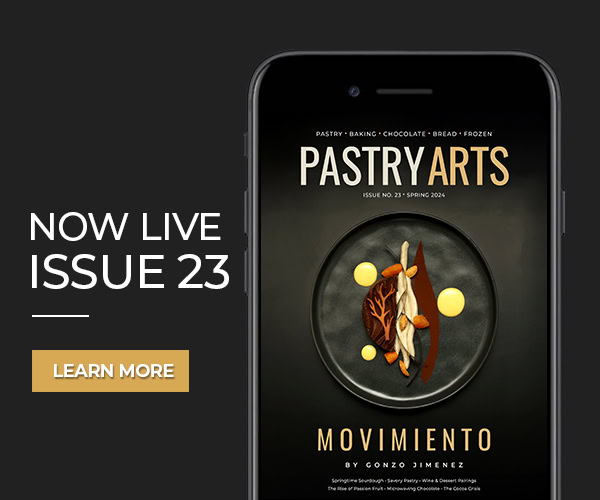(This article appeared in the Winter 2020 issue of Pastry Arts Magazine)
In this singular stay-at-home era, dessert kits are a booming business. Providing pre-measured ingredients for creative seasonal-themed recipes, step-by-step instructions, and optional equipment from Bundt pans to spatulas, the kits are appealing to both novice and advanced home bakers, and have become welcome gifts for subscription box aficionados. From Apple Sharlotka to Moravian Sugar Cake, Man Crate to Mochi Ice Cream, there are myriad options – simple or sophisticated, subscription or single purchase, kits for kids, pets, and vegans, even one for a single cookie. A majority of baking box entrepreneurs helm mail-order operations, but bakeries and dessert wholesalers are also offering kits to go, and partnerships with retailers are adding another potential for profit.
 Meal kits arrived on the culinary scene in 2012, and it was one of the pioneers, Blue Apron, that inspired Agathe Assouline-Lichten to adapt the concept for sweets. After several post-college years marketing luxury goods, Agathe switched careers, heading to hotel school in Lausanne, Switzerland. Back home in New York, she realized that her busy young professional friends had small kitchens, few utensils, and little time for grocery shopping. “ So,” she recalls, “I thought that if we make baking easier and fun – for me it brings joy and happiness – there is an opportunity to make something from scratch that you can serve to others…what if a box shows up at your door?” Partnering with her sister, Arielle, a designer, they launched Red Velvet in 2015, using their own savings, “and I packed all of our boxes; we hired one, then two employees and grew from there.” Currently located in an industrial space in Brooklyn that houses many food firms, Red Velvet has a full-time staff of 10 in the warehouse, and employs freelancers for tasks like photography, customer service, and copy editing. For subscribers, about 50 percent of sales, Red Velvet ships a box a month nationwide with two recipes, designated easy, moderate or advanced.
Meal kits arrived on the culinary scene in 2012, and it was one of the pioneers, Blue Apron, that inspired Agathe Assouline-Lichten to adapt the concept for sweets. After several post-college years marketing luxury goods, Agathe switched careers, heading to hotel school in Lausanne, Switzerland. Back home in New York, she realized that her busy young professional friends had small kitchens, few utensils, and little time for grocery shopping. “ So,” she recalls, “I thought that if we make baking easier and fun – for me it brings joy and happiness – there is an opportunity to make something from scratch that you can serve to others…what if a box shows up at your door?” Partnering with her sister, Arielle, a designer, they launched Red Velvet in 2015, using their own savings, “and I packed all of our boxes; we hired one, then two employees and grew from there.” Currently located in an industrial space in Brooklyn that houses many food firms, Red Velvet has a full-time staff of 10 in the warehouse, and employs freelancers for tasks like photography, customer service, and copy editing. For subscribers, about 50 percent of sales, Red Velvet ships a box a month nationwide with two recipes, designated easy, moderate or advanced.
 The kits – cookies, cupcakes, cakes, tarts, desserts – usually include all ingredients except eggs, along with disposable tools like cupcake cups, parchment paper and piping bags. Reasonably priced equipment such as springform and tart pans are optional add-ons. Some Red Velvet kits contain perishable products – mascarpone in Tiramisu; buttermilk, butter and cream cheese in Red Velvet cupcakes, but, Agathe explains, “We’ve gotten very good at it over time; everything we ship goes in a foil bag or pouch and we know the temperature needed and how long it has to travel.” While most of their recipes originate in house, others showcase local establishments. An eggnog holiday cookie sandwich was adapted from the Brooklyn bakery Ovenly, and a brioche bread pudding featured famed Balthazar baguettes. There are also tie-ins with leading purveyors like Williams Sonoma and Fresh Direct, and a potential deal is in the works with Netflix.
The kits – cookies, cupcakes, cakes, tarts, desserts – usually include all ingredients except eggs, along with disposable tools like cupcake cups, parchment paper and piping bags. Reasonably priced equipment such as springform and tart pans are optional add-ons. Some Red Velvet kits contain perishable products – mascarpone in Tiramisu; buttermilk, butter and cream cheese in Red Velvet cupcakes, but, Agathe explains, “We’ve gotten very good at it over time; everything we ship goes in a foil bag or pouch and we know the temperature needed and how long it has to travel.” While most of their recipes originate in house, others showcase local establishments. An eggnog holiday cookie sandwich was adapted from the Brooklyn bakery Ovenly, and a brioche bread pudding featured famed Balthazar baguettes. There are also tie-ins with leading purveyors like Williams Sonoma and Fresh Direct, and a potential deal is in the works with Netflix.
Another pair of sisters, Jordan and Anouk Rondel, have been selling baking kits to Kiwis for three years from their popular Auckland New Zealand bakery, the Caker.
 Now they have set up shop in the United States with a stellar marketing affiliation, Urban Outfitters/Anthropologie. Since last fall, three of the Caker kits, Lemon Strawberry Poppyseed, Matcha Cherry, and Flourless Dark Chocolate Gold Leaf, are selling in the retailer’s online marketplace in the $25 and under gift sections, and at the Caker’s own website. “We prefer the flavors to be suitable for all year round rather than seasonal,” says Jordan, a self-taught baker who founded the Caker a decade ago and enlisted her lawyer sister in 2015 to help grow the business. Undaunted by the logistics of staking out new territory in the middle of a pandemic, the Rondels forged ahead to find new suppliers, source ingredients, and locate warehouses. Jordan Rondel is also selling custom cakes for large events and anticipating opening a bakery in Los Angeles.
Now they have set up shop in the United States with a stellar marketing affiliation, Urban Outfitters/Anthropologie. Since last fall, three of the Caker kits, Lemon Strawberry Poppyseed, Matcha Cherry, and Flourless Dark Chocolate Gold Leaf, are selling in the retailer’s online marketplace in the $25 and under gift sections, and at the Caker’s own website. “We prefer the flavors to be suitable for all year round rather than seasonal,” says Jordan, a self-taught baker who founded the Caker a decade ago and enlisted her lawyer sister in 2015 to help grow the business. Undaunted by the logistics of staking out new territory in the middle of a pandemic, the Rondels forged ahead to find new suppliers, source ingredients, and locate warehouses. Jordan Rondel is also selling custom cakes for large events and anticipating opening a bakery in Los Angeles.
For bakeries already flourishing in the United States, DIY kits are providing an additional source of income during COVID-19. Aya Fukai, a James Beard nominee and The Chicago Tribune’s ‘Pastry Chef of the Year’ in 2018, had worked at several of the city’s high end establishments before opening Aya Pastry, a chiefly wholesale operation preparing desserts for some 40 hotels and restaurants, with retail available on weekends. Although the virus devastated her hospitality portfolio, Aya, with a crew of two dozen bakers, pastry cooks, dishwashers, managers and drivers, has continued to service stores and cafes, opened the bakery full time, and started offering frozen pastries, cookies, pizza dough, and butter, chocolate, and cheese croissants, to customers to bake at home. “At the beginning,” Aya notes, “people were so scared, and they wanted to have something fresh, baking as needed.” Her pastries are made and frozen the night before, assembled in a kit with baking instructions and a parchment pan liner, ready for pick up or delivery in the greater Chicago area.
In Milwaukee, Erica Elia and her staff of 25 at celebrated Classy Girl Cupcakes, the retail and wholesale bakery she started in 2009, developed both solo and subscription kits for both pick up and local delivery during the pandemic. A brunch box includes a pound of local favorite Anodyne Coffee, a coffee mug, choice of cupcake batters like orange Mimosa, buttercream frosting in a disposable piping bag, and flavor coordinated toppings.
Although Classy Girl’s Cupcake kits are pandemic-centric, the baking box business has been rapidly expanding over the past three years. The inclusive subscription platform Cratejoy hosts many sites with a format that typically includes precise recipe instructions, video tutorials, baking tips, surprise gifts, and detailed FAQs dealing with questions ranging from shipping costs to cancellation fees, both common concerns for box makers.
While website formats tend to be similar, variations on a theme abound – from Mixbox’s traditional Moravian Sugar Cake to Fikabrod’s jars and packets of regional products like ghee to make garlic naan. BakeEatLove promises surprise bonus kitchen tools; FreshBakedCookieCrate includes top brands like Valrhona chocolate; Foodsters stresses junk-free ingredients and recipes with less sugar; Baketivity offers recipes and activities for kids. Whatever the selection, as Aya Fukai concludes, “It’s very special to be able to eat something that is fresh out of the oven.”





You must be logged in to post a comment.